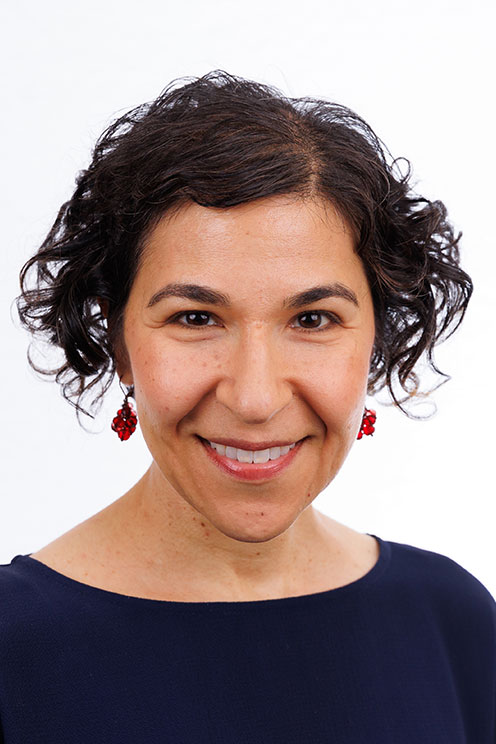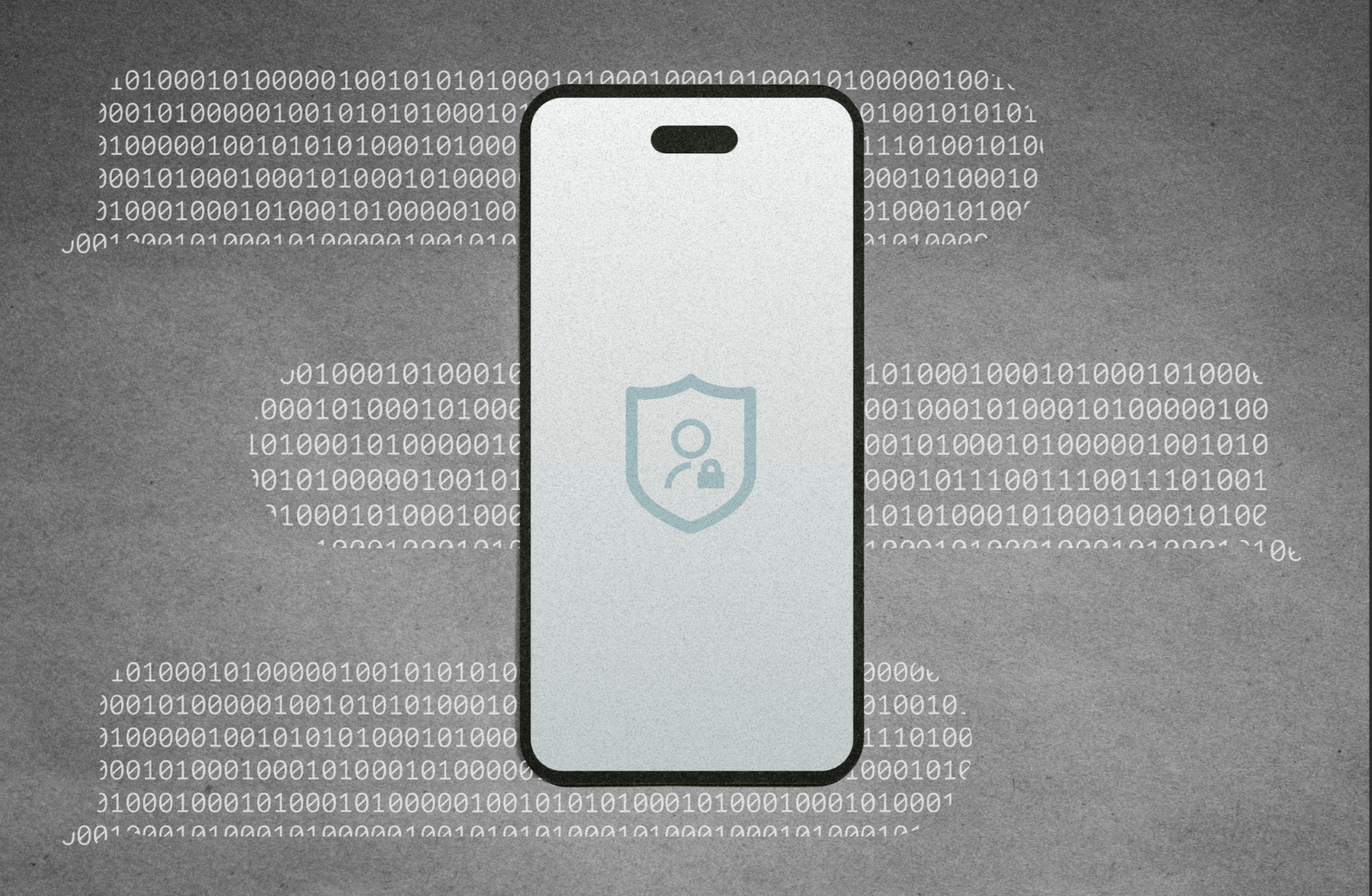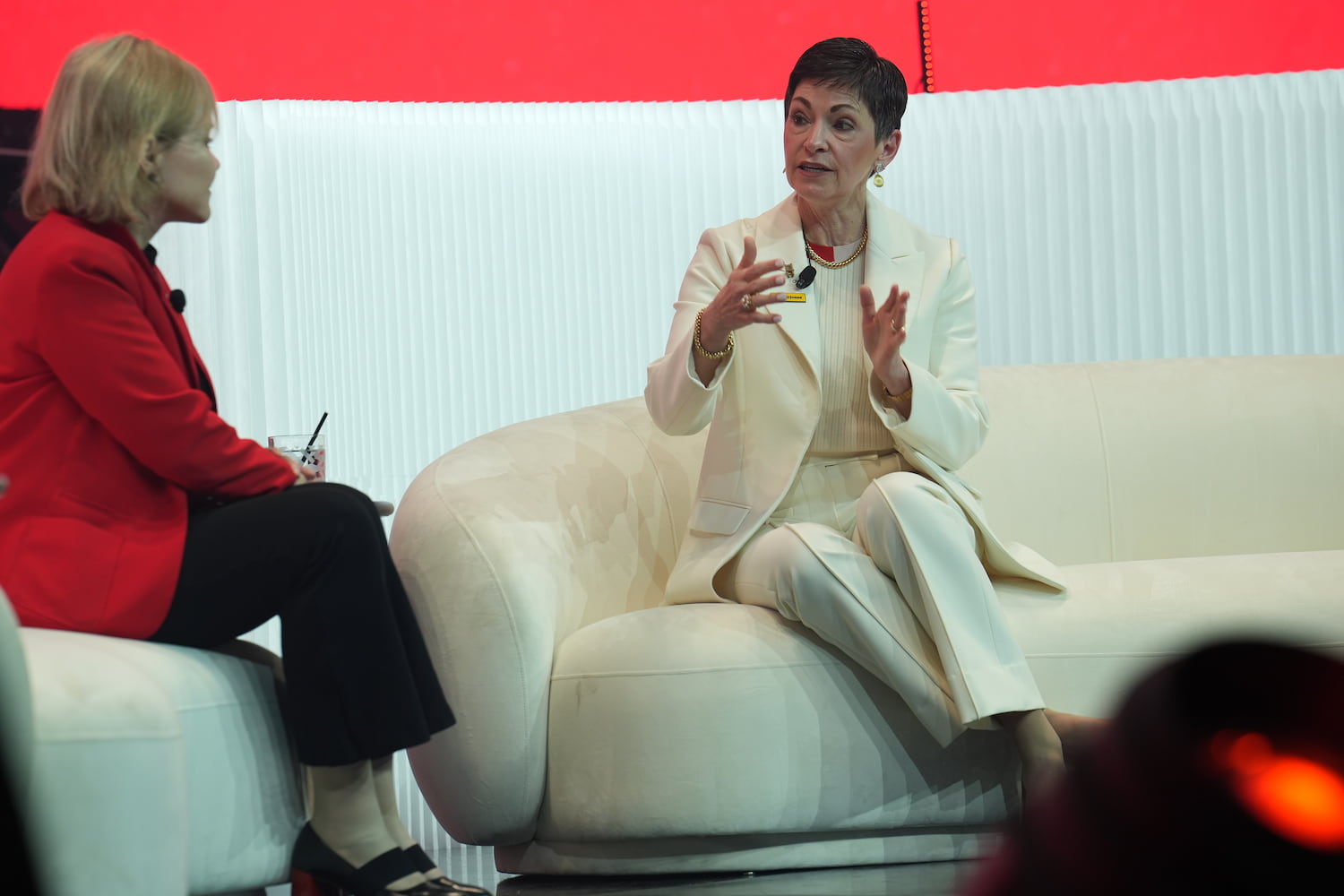Diversity & Inclusion, Employee Experience, Talent Management
“I don't want to cut a check every year to close a gap. I think that is a symptom of a bad system. I want to fix my system.”
On this episode of the Better podcast, Pat Wadors, chief people officer at UKG, talks about misconceptions around pay equity, and why transparency and education are essential to fixing pay gaps.
She discusses why being an introvert and dyslexic are gifts, how showing humility and asking for help are superpowers, and why we should all bring our authentic selves to work. She also tells us what nursing was like for new moms before pump rooms were available at work.
How we should define pay equity:
What is it not? It's not equality. People bring different skills and experience to the table. There are different compensation plans in every company. Are you at the 50th percentile or less? Do you have a bonus plan? Some do, some don't.
Imagine you and I work for different companies. Your base pay is $50,000 and mine is $55,000. You're going to think you're underpaid by $5,000. But what you didn't tell me is that you also got a bonus plan of 10%. You have the opportunity to earn an additional $5,000 and then some if you outperform. I don't have an upside. I'm capped at my 55k. Your actual W2 was $ 57,000, but we don't talk about that. I think transparency and education are the tools.
On pay gaps at work:
I don't want to cut a check every year to close a gap. I think that is a symptom of a bad system. I want to fix my system, my ecosystem. And that means at hire, I don't allow a recruiter or hiring manager who doesn't have the years of experience to pay you less because they can. They should pay you what they should. So, let's teach that.
On creating an ecosystem of accountability for pay equity:
How do you create an ecosystem of accountability? That's the checks. That's the mirror effect. I don't judge because I have the strong belief and faith that everyone wants to do their best work.
I’ve pointed out, “Here's where you're impacting somebody. Did you think about this? For similar work with similar experience, they should get similar pay. Help me understand why you think they shouldn't." And they say, "I think they should." And I say, "Well then your program, your approach creates disparity that I don't think you intend. How do you want to fix that?"
I don't tell them how to fix it. I ask them how they want to fix it. And then it gets them into problem solving and we co-create an amazing opportunity.
I remind people that someone's going to watch this. That's my job. If I see a bias towards high ratings for X population and Y on the other side, I'm going to go hold up a mirror, "Is this what you meant to do? Because one could interpret the data this way. Is this what you want me to see?” "Oh no, Pat, no. Let me take that data back to my team and rework this.”
On her HR career:
I knew I wanted to run HR since I was 19. I love it. I am grateful every day I get to get up and do something that fits me and my purpose. I love the creativity. I love the quirkiness. I love learning and meeting people. It just fits me.
Being a female in a mainly male company sometimes was hard. And how do you be a new mom? I breastfed in a broom closet in the receiving center downstairs in a broom closet with my foot on the door to make sure no one came in so I could pump.
On being authentically yourself:
I'm an introvert and my first ever blog was about being an introverted leader in Silicon Valley when I was at LinkedIn. And some of my executives at LinkedIn pushed me to publish the blog.
I was nervous, but because of that, I became acquainted with and friends with Ariana Huffington. She introduced me to Susan Kane.
The gifts of being authentically you and bringing it to the world and leaning into others, it's just been this never-ending gift for me. That's what I would tell everyone. Continue to learn, be your authentic self. And then share your story. Who you are, not what you do is more important.
Listen to all episodes
Subscribe to Better wherever podcasts are available so you don't miss an episode of season three.
Roula Amire:
Welcome to Better by Great Place To Work, the global authority on workplace culture. I'm your host, Roula Amire, Content Director at Great Place To Work. On this episode, we speak with Pat Waters, Chief People Officer at UKG. Pat, welcome to the podcast.
Pat Waters:
I'm excited to be here.
Roula Amire:
I'm happy to have you here. Pat, you are the Chief People Officer at UKG, the parent company of Great Place To Work. And UKGs a champion of pay equity and believes that every person should be paid fairly. Many organizations have certainly made progress here, but on average, women make 82 cents for every dollar men make.
You at UKG just sponsored a study that showed both employees and employers recognize there's a gap, that there's a pay gap, and that it is a priority of their companies, but only 41% believe their employers have achieved pay equity. So there's a perception gap around this issue. What is driving that gap?
Pat Waters:
Lack of transparency. I think we're not educating enough about the journey, was does it take. Human beings, we're funny. In absence of information, in a black box, we will put negativity in it, 80% of us. And so I think if we shine the light on the situation, the process, the progress we're making, I think we'd change that perception and build trust along the way.
Roula Amire:
If a leader's listening to that and they say, "Well, Pat, transparency sounds good, but we can't really be fully transparent." What would you say?
Pat Waters:
They've said that to me and I say, "Yes, we can." Because if you think about in any organization, about 25% of your organization is management level. Let's assume, right?
Roula Amire:
Yep.
Pat Waters:
So they get to see the magic behind the curtain. They know our pay ranges. They know how we do calibrations. They are employees, too. And if you think they're not talking and waiting for us to be transparent and what does it mean, we're naive. And so I would rather, instead of having my employees put their pay in some website that is not intelligent, meaning is it just base and bonus? Is it base, bonus, and equity? Is it like... So you don't know the data that goes into these anonymous websites. And so I'd rather help the managers communicate what is a pay range, what's a story.
Pay equity doesn't mean I pay equally. There's confusion around that. There's confusion around how do you progress in a salary range and what does it mean? And if you start in a startup organization, and this is where I've had these conversations, cash is king. So you're not going to pay high in cash, but you'll give equity away. You'll do something else along the journey. And so but as you mature as an organization, you pay higher on base salaries. So you're going to have this inequity of base pay, not in total earnings. And it takes about four years after an organization goes public to normalize all the components of comp. But do we tell employees that? No.
So I think that if you say, "Look, overall your earnings are equal to or greater than your peers. Even though your base pay might be lower, you've had these other opportunities to earn capital, to earn better for your family. This is what the story is." And then people go, "I get it." And it's, I think transparency unlocks so much. And so I go, "Trust me, let's pilot it. Let's have a conversation and I'll show you how to do it." And then they usually join the journey.
Roula Amire:
Do you think that's where we should start defining how are we defining pay equity?
Pat Waters:
Yes. Always start with the definition. What do you mean by pay equity?
Roula Amire:
Yes.
Pat Waters:
What is it not? It's not equality. People bring different skills and experience to the table. There are nuances to that. There are different compensation plans in every company. Where do you pay to market? Are you at the 50th percentile or less? Do you have a bonus plan? Some do, some don't. So imagine you and I are working for two different companies. Your base pay is $50,000, mine is $55,000. And you're going to think you're underpaid by $5,000.
Roula Amire:
Right.
Pat Waters:
But what you didn't tell me is that you also got a bonus plan of 10%. You have the opportunity to earn that additional $5,000 and then some if you outperform. I don't have upside. I'm capped at my 55. Your actual W2 was 57,000. But we don't talk about that.
Roula Amire:
At all.
Pat Waters:
At all.
Roula Amire:
Yes.
Pat Waters:
At all. And I think transparency and education is the tool.
Roula Amire:
So if that's the tool, who's responsible for closing the gap? Is it leaders, CEO level, CHRO, pushing for the transparency?
Pat Waters:
Yes, yes, yes.
Roula Amire:
Okay.
Pat Waters:
Right.
Roula Amire:
All the above.
Pat Waters:
All the above. So I love being a change catalyst. I'm always about transparency because I am confident that if I'm wrong, you'll tell me. Just tell me with grace and I'll fix it, I'll get it done. If I'm right, I get to educate, right? So if you push back and say, "I'm not paid fair." I'm like, "well, let's unpack that. What does that mean? What does fair mean to you?"
And then you might be comparing yourself, what I say, chasing the wrong rabbit. You might be comparing yourself to the wrong baseline, the wrong job family, the wrong blank. And then I go, "Here's what it means."
Roula Amire:
Also according to this study, only 49% of organizations have a well established pay equity plan.
Pat Waters:
Yes.
Roula Amire:
First off, does that number surprise you? Would you expect it to be higher, lower, just about right?
Pat Waters:
I was expecting it, hoping it to be higher. I think that every leader walks into the organization trying to do good. I don't think it will go in as a manager and try to mess with people. Right?
Roula Amire:
Agreed. Yeah.
Pat Waters:
And so with that premise, with that belief system, they're doing it organically. They're doing it based on their hiring. They're doing it based on their budget. You don't know the constraints in which that pay gap starts to happen. And it usually starts higher and it compounds over time while you're in an organization.
And so if I am constrained with budget, then I'm going to negotiate harder for you to come in at a lower base pay, put more in variable maybe. So you have the upside, but there's no guarantee. But I'm going to want to make you perform hard for that money. And so do you have the skills negotiate with me? Right? Do you have the same knowledge that others have to negotiate?
So negotiating, and I have a theory out there that would be really cool in a future world that salary ranges are very narrow for the job you need to do. It's $10 to $13 based on experience and whatnot with some criteria. And each time you move your job, there's this methodology, just guiding principles on pay. So the broader the range, the more inequity you can create. The narrower the range, the less wiggle room you have.
Roula Amire:
Right.
Pat Waters:
And then if you want to reward outsized performance, you have other vehicles in which to do that, right? You have...
Roula Amire:
Like?
Pat Waters:
The bonus plan, you have special spot bonuses, you might have an equity plan for long-term incentives. You do something for the organization, the customer that is a two year plan horizon line, you do that for us, you can earn X dollars in equity in the company. So now I have an ownership mindset. I have a long-term goal. This is meaningful dollars for me and my family. I'd sign up for that.
Roula Amire:
Who wouldn't?
Pat Waters:
Yeah. Who wouldn't? And so...
Roula Amire:
When you lay it out, it sounds so logical. But this future plan, what is the likelihood that this might be commonplace in the future of work, this kind of thinking, this kind of plan. It makes sense. I mean, who wouldn't say, "Yeah, sure, of course."
Pat Waters:
I think they're all marching towards that, the more visible we are with our ecosystem of equity. And that's what I was talking to Brian Reeves at UKG about. I'm like, "Look, I don't want to cut a check every year to close a gap. I think that is a symptom of a bad system. I want to fix my system, my ecosystem." And that means at hire, I don't allow a recruiter or hiring manager who doesn't have the years of experience to pay you less because they can. They should pay you what they should. And how do I teach that? So let's teach that, right?
Roula Amire:
You don't even want the gap.
Pat Waters:
Not the beginning at all.
Roula Amire:
Exactly, right. Fixing the gap is indicative that we have a big problem here.
Pat Waters:
Yes. And...
Roula Amire:
Yeah.
Pat Waters:
What's interesting is that if you slow our neurological role in every key decision, we will make, I would love to say outstanding decisions, much healthier decisions, and I've proved it out time and again. If I slow your role during compensation cycles and say, "Check your bias, check for gender, check for ethnicity, check for performance. Look at your distribution curve. Is it healthy? Do you have a bias the more close your team is to you, the more they get as increases? Less visibility, they get less increases?" Because visibility, advocacy matters. Is that the right thing or do you have clear goals? If you see bias in who I see most, that means your goal system is weak.
Roula Amire:
Yeah.
Pat Waters:
The data should be there to self-report my impact to the organization. So now I'm going to go after those goal setting skills and the accountability on that so I don't have to rely on recency bias or closeness to me. So you have to go to the root cause. That's the ecosystem.
Roula Amire:
So it's at the hiring process at that level, before someone's even hired. Sorry, in the recruitment process, before someone is hired, pay what the job...
Pat Waters:
Is worth.
Roula Amire:
Is worth. Not what you can get away with. Not, "Oh, this person has a family, so they're going to expect this." None of that bias.
Pat Waters:
None of that.
Roula Amire:
There can't be. None of that. One, step one. And then step two is once they're hired and working for you, you just mentioned you just rattled off a litany of, let's call it the check yourself list.
Pat Waters:
Yes.
Roula Amire:
Recency bias, all these things. So that's like an ongoing, living, breathing.
Pat Waters:
Yes.
Roula Amire:
It's not just a pay equity plan.
Pat Waters:
It's how you live.
Roula Amire:
It's a living, breathing.
Pat Waters:
Ecosystem of care and checking yourself.
Roula Amire
Yeah.
Pat Waters:
As a leader. And then.
Roula Amire:
Yeah.
Pat Waters:
And you keep reminding people that someone's going to watch it. That's my job. I'm going to watch this. And so if I see a bias towards high ratings for X population and Y on the other side, I'm going to go hold up a mirror, "Is this what you meant to do? Because I could interpret, one could interpret the data this way. Is this what you want me to see?" "Oh no, Pat, that's not. No. Let me go, let me take that data back. Let me go with my team and rework that."
Roula Amire:
Have you had those conversations?
Pat Waters:
Oh yeah. Over and over again.
Roula Amire:
Do they surprise? I mean, what is their reaction? Is it, "Oh, I had no idea."
Pat Waters:
80, 90 percent, no idea.
Roula Amire:
Yeah.
Pat Waters:
No idea. They don't see it.
Roula Amire:
Until the mirror's in their face.
Pat Waters:
Yeah. So how do you create an ecosystem of accountability? That's the checks. That's the mirror effect. I don't judge because I have the strong belief and faith that everyone wants to do their best work. I've never met a truly evil person at work that says out to get somebody. I haven't.
Roula Amire:
Yeah.
Pat Waters:
When I've met those naive managers, and I'm not naive, I met my earlier stints, I've met a manager who prided themselves on getting talent as cheap as they could, as cheap as they could because they were saving budget.
Roula Amire:
That's in budgeting their feather.
Pat Waters:
They were like, "Look how much money I saved." And they were thinking holistically about budget. They weren't looking at a demographic. They were just going after the cheap. But they didn't understand that they can negotiate harder. People would give in quicker in certain demographics. And so they were disproportionately through their tactics, impacting certain communities.
Roula Amire:
Marginalized.
Pat Waters:
I'm like, "Here's where you're impacting somebody. Did you think about this?" "Oh, I didn't think about that." And so I'm like, "Look, for similar work with similar experience, they should get similar pay. Help me understand why you think they shouldn't." And I go, "I think they should." And I say, "Well then your program, your approach creates disparity that I don't think you intend. How do you want to fix that?" I don't tell them how to fix it. I ask them how do they want to fix it? And then it gets them into problem solving. And then we co-create an amazing opportunity.
Now as soon as they have ownership, I don't have to watch over them again. They all of a sudden become the owner of the outcome.
Roula Amire:
You shine the spotlight and they take it from there.
Pat Waters:
That's the ideal state.
Roula Amire:
Right. Again, I love this future, the future plan. You've been in HR for most of your career in the HR space. All of your career?
Pat Waters:
All my career. I knew I wanted to run HR since I was 19. So I jumped out of HR a couple of times to do sales and pharmaceutical because I wanted understand how to a quarter a quota, how do you close business, the P and L. I wanted to learn that urgency, because in HR you don't feel that same sense. Then I got into operations, like what's the ecosystem of how you build a product, serve a product, serve a customer, and I did that in semiconductor. And then I understood that behavior and how work gets done, a lot of it's on technology, so I ran technology and implemented systems and drove large scale change because I wanted to understand the psychology of change.
Roula Amire:
What did you study in college?
Pat Waters:
I studied business administration and psychology.
Roula Amire:
Well that's a home run for where you landed as a HR pro.
Pat Waters:
I love it. I am grateful every day I get to get up and do something that fits me and my purpose. I love the creativity. I love the quirkiness of it. I love learning and meeting people. It just fits me.
Roula Amire:
That is a fit. I mean you have the psychology side, the people side, and of course business. Did you know wanted to meld these two or you just like those courses in college. I mean, was this an intentional ...
Pat Waters:
Accidental intention. So I'm going to age myself a little bit. So when I was in college, I was a fine art student because I was diagnosed with dyslexia in college and I was terrible in math and anything required good spelling. It was just, I couldn't do it. And I went to a career center and they told me, "Hey, you have dyslexia," and I'm thrilled because they said, "It had nothing to do with your iq, it's about how you process and put it on paper. So with technology and computer and spell check, you'll be fine."
Roula Amire:
So you didn't discover this until college?
Pat Waters:
I just thought something was wrong.
Roula Amire:
Yeah. That's a struggle.
Pat Waters:
Yeah, it was a struggle. But it gave me other gifts of grit and observation. And so I have a superpower because of it. But in this assessment said you love HR, you love teaching and you love social work. And so my dad and my uncle were in HR and I interviewed them both. And my uncle told me that a company's operational expense, 80 percent's the cost of talent. So 80 cents of every dollar spent by a company is related to you and I. And I'm like. "Really?" And he goes, "Yep. If you're manufacturing, capital intents is much less. If you're a consulting firm, it's a hundred percent cost of talent. But Patty, think about it. It's the compensation, it's the benefits. It's the software we give you to do your job. It's your travel and entertainment. It's the building you sit in, training that you get, the benefits. All that's the cost of talent. So if you underpay and you have high attrition, you're not going to be as profitable. If you overpay, you won't be as profitable. If you don't develop your team, you won't grow the business. If you don't care for your wellness of your employees, they won't be there in times of need. So you've got to dial all these things carefully to create a great company."
And I'm like, "I want to run HR Uncle Roland." I saw in front of me all this cool dashboard like a car. And I'm like, "I want to do this." And he goes, "Patty, do you want to be a recruiter benefits analyst?" Because women didn't do HR then. I'm like, "No, I'm going to run HR." I had to argue with him. "I'm going to run hr. So teach me how."
Roula Amire:
If someone says, I see a dashboard in my future, you're destined for HR.
Pat Waters:
It's so funny. And so he got me connected to this college in New Jersey Rampo College in Mahwah, New Jersey. No one's ever heard of it. They're amazing.
Roula Amire
Yeah. Are they still there?
Pat Waters:
They're still there.
Roula Amire:
Shout out.
Pat Waters:
They're amazing. Shout out to Rampo. And they took an experiment. They took 26 students and they cobbled together pre HR degrees. So this is in the early eighties, mid eighties. They said, "Look, we will take 26 students that want to go in this field. You'll have sponsorships." Beck and Dickinson was mine. I moved from Louisiana to do this program in New Jersey. And so they said, "We're going to cobble it together and it's going to be a BS degree in Business Administration Psychology and we're going to teach you labor law, accounting, all the business stuff and sociology and team dynamics and psychology." And so they cobbled this together in such a ...
Roula Amire:
That's incredible.
Pat Waters:
It was so good, so good.
Roula Amire:
No wonder you are quite the trailblazer in HR. I mean that's such a unique program.
Pat Waters:
It was so fabulous.
Roula Amire:
Yeah, it sounds fabulous.
Pat Waters:
It was so fabulous. And I remember even with my learning processing disorder, spelling wasn't such a big deal at that time, but I was doing learning computer programming, I was learning things, and I learned how to ask for help. I learned my humility of not knowing something was a superpower and saying, "How can you help me? How can you get into my DNA of my core so I really know it? I don't memorize anything. I know it." And that journey was just an amazing journey. And I continue to carry that mindset forward.
Being a female in a mainly male company sometimes was hard. And how do you be a new mom? I breastfed in a broom closet in the receiving center downstairs in a broom closet with my foot on the door to make sure no one came in so I could pump.
Roula Amire:
Oh my gosh.
Pat Waters:
And it was insane. And I'm like, so these women did ...
Roula Amire:
What did other women do? Were they all going in broom closets?
Pat Waters:
No. So what they would do is stop nursing. It was pre-nursing rooms. And then I'm like, "Look, I've got to nurse. I want to nurse till eight months. I'm not asking for years. I'm not asking my four year old to follow me around. I'm just saying I believe in this deeply and I'm trying to pump. Give me a room to pump." The girls' room only had one or two stalls back in the day, so you couldn't take a stall for 30 minutes. Think about it. And the machines were so loud back then and I'm like, "Oh, it's mortifying.". It was so bad. And I'm like, "Oh, man."
Roula Amire:
That's mortifying.
Pat Waters:
It's mortifying. And so I'm like, "Shoot, I'm just going to go to find the most remote closet possible that no one's going to bother me and pump twice a day so I stay active, and do it as long as I willingly can." And then if I had a hard time, I started bringing Katie to work in her little bucket chair when I know I had long hours. I'm like, "I refuse to give up on my core belief. I don't care what you think."
Roula Amire:
Did anyone say anything?
Pat Waters:
Oh, occasionally, yeah. But then the gifts came.
Roula Amire:
I'm glad you did that. Because I imagine other women are like, "Oh look at ... I might bring my kid," or whatever.
Pat Waters:
Yeah, exactly. Katie was a baby in a bucket chair. How much damage will she do? And it wasn't every day. It was just these moments of Yeah, sharp values were clear. My husband couldn't have her. I still need to nurse her and no daycare available. So I'm going to take her to work cause I have to get work done. And you didn't work remotely. You didn't have all the connectivity. So that's what I just told my boss. I'm like, "Choose your poison. You want me to get this stuff done? I'll do it. If not, I'll go home. Because Katie and I going home's really chill." And then he was like, "Stay." And I'm like, "All right."
Roula Amire:
God. Yeah. I can't imagine a time without pump rooms. I mean that's just like ...
Pat Waters:
I applaud all the women that paved the way to make that real. They have no idea.
Roula Amire:
All the women in the closets or wherever they could find something, a space, bathrooms, stalls.
Pat Waters:
Their car.
Roula Amire:
What piece of a career advice would you tell your younger self?
Pat Waters:
So I think what I would've told my younger self is to believe in myself even more. Have more joy in the journey. I was focused, but I still felt I had to earn my space and I could have taken less anxiety out of that journey maybe.
Roula Amire:
Have you gone back to your college?
Pat Waters:
Yes, yes.
Roula Amire:
Recently? Have you spoken?
Pat Waters:
Yes.
Roula Amire:
What was that like?
Pat Waters:
It was amazing. I was like, "Oh my goodness." And so I met the president Jeb. She's there, her inauguration as I forget which number president is this month. And so they gave me a tour. I got to speak to the students. I wanted to speak to the community group of students with disabilities and talk about their journey. And it was such a blessing to go on campus and stay connected with them. And that's a gift. And then I was telling President Jeb, I'm like, "It's so funny because I get to speak now at UCLA or USC or Stanford and Berkeley. I could never get in those colleges, universities, ever with my academia background. And to have them think of me as a thought leader, to have them imprint on their student body is, I do not take that for granted. I'm like, pinch me."
Roula Amire:
I feel it. Yes. You're like a giddy school girl right now. You're like. "Yes I went. I spoke and they asked me."
Pat Waters:
Yes, they asked me. So wow, that's full circle.
Roula Amire:
When was that?
Pat Waters:
It was probably early May. I went to Rampo College and spoke to the students. And we still stay in contact. I just had a call with her and their development people and we have a relationship now. It's so funny.
Roula Amire:
I feel like you're more excited by that than other bigger name colleges because it's so personal.
Pat Waters:
It's so personal. And they gave me that opportunity to learn.
Roula Amire:
Yeah, they gave you the opportunity, but then you walked through the door and you made it.
Pat Waters:
I made it. It took me five years to graduate, but I made it. I have that degree.
Roula Amire:
Nothing wrong with a five year program.
Pat Waters:
No, no. I'm proud. No one knows what college I went to. I am so proud of what I did.
Roula Amire:
Now they do.
Pat Waters:
Now they know, Rampo College, Mahwah, New Jersey.
Roula Amire:
Is there a book, a podcast that you would suggest to your fellow peers or where you get inspired and continue to learn and develop if it's not through a book or a podcast?
Pat Waters:
Gosh, I'm always learning and copying shamelessly and giving shamelessly everything I do on giveaway. I think Daniel Pink, I love his work. I love the book Rethink. How do you change your perspective? Because the way my brain is wired, I always think differently. And I just, The Power of Regrets. I love that book. I love if I regretted something, what do I do forward? They don't have to have that regret. And regrets are amazing things. Without regrets you don't learn.
Roula Amire:
Regrets are gifts.
Pat Waters:
They're awesome. Mistakes are awesome. And I like how people reframe things. Susan Kane in Quiet. My first blog, I'm an introvert and so my first ever blog was about being an introverted leader in Silicon Valley when I was at LinkedIn. And some of my executives at LinkedIn really pushed me to do this blog. I was nervous. When I pressed send and posted, I think I wanted to vomit. It was so scary. And so because of that, I became acquainted with and friends with Ariana Huffington. She introduced me to Susan Kane. I got to do a thing with Susan Kane. I went to her house in New York. The gifts of being authentically you and bringing it to the world and leaning into others, it's just been this never ending gift for me. So that's what I would tell everyone. Continue to learn, be your authentic self. And then share, share, share, share, share your story. Who you are, not what you do is more important.
Roula Amire:
Well, and people want to be seen in the world and see themselves.
Pat Waters:
Absolutely.
Roula Amire:
So someone's seeing themself in you and that's inspiring to them.
Pat Waters:
Yeah. It's amazing, when I first start talking about being an introvert or dyslexic, they're like, "I've never heard an executive talk about a disability." And I'm like, I have a daughter that's neurodiverse. She struggles. She's under my conservatorship. She will always be in my home. And she's the best gift my family ever had. And the most struggle, but the most learning. And so how do you take, these life ...
Roula Amire:
Both seem to go hand in hand.
Pat Waters:
Yes.
Roula Amire:
Why is that? The hard things are the best things, but they're hard. But they're gifts.
Pat Waters:
Yes. Endless circle.
Roula Amire:
Along those lines, who is the most important person you talk with every day, personally or professionally or both?
Pat Waters:
My family, my husband, my kids, every day. My boys call their sister every day.
Roula Amire:
They do?
Pat Waters:
Every day.
Roula Amire:
I haven't called my brother. Is he listening? He doesn't call me every day.
Pat Waters:
Yeah. My son Ben calls Katie and FaceTimes with their everyday. And if she doesn't call, he'll tease her about it. And she has anxieties with her disability. And so if I'm out with my husband to dinner and we're like 10 minutes late, Katie's going to FaceTime Eddie. If Eddie doesn't answer, she'll call Ben. And then they'll call me like, "Katie's getting anxious, mom. We're chatting with her or showing her the bunny. We're showing the baby." I'm blessed to have this really cool family unit with these two boys that have just loved Katie to no end.
Roula Amire:
How old are your kids?
Pat Waters:
So Ben just turned 28. Got married last year and had a baby in May. My second son is turning 27 in November, so they're 14 months apart. And then Katie is 24 and a half.
Roula Amire:
Pat, this flew by. Thank you so much for joining me today. I really loved the conversation.
Pat Waters:
Thank you. This was fun for me. I hope it sparked something for somebody in a good way or just made them feel happy. I would love that.
Roula Amire:
It will. It did for me, so there's your one person.
Pat Waters:
All right, I'm done. Success, check.
Roula Amire:
We can end the day now.
Thank you for listening to this episode of Better. You Can Stream this and previous episodes wherever podcasts are available.











